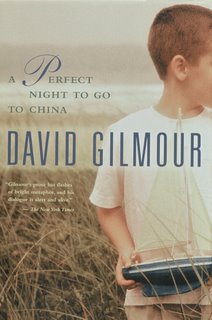The T.S. Review is pleased to announce that  David Gilmour has just won the 2005 (Canadian) Governor General's Literary Award for Fiction for his novel A Perfect Night To Go To China. Gilmour has long been a fixture on Canadian television. He lives in Toronto.
David Gilmour has just won the 2005 (Canadian) Governor General's Literary Award for Fiction for his novel A Perfect Night To Go To China. Gilmour has long been a fixture on Canadian television. He lives in Toronto.
I recently reviewed this novel for Books in Canada, where I said: "This seems one of the most refreshing, moving and supple works of fiction written since the 21st century began; it is lovely to see it achieve so much that is uniquely Canadian by handsomely converting great American and European works, without missing a beat. " I stand by my words. This is a Canadian masterpiece. Bravo to Mr. Gilmour.
 David Gilmour has just won the 2005 (Canadian) Governor General's Literary Award for Fiction for his novel A Perfect Night To Go To China. Gilmour has long been a fixture on Canadian television. He lives in Toronto.
David Gilmour has just won the 2005 (Canadian) Governor General's Literary Award for Fiction for his novel A Perfect Night To Go To China. Gilmour has long been a fixture on Canadian television. He lives in Toronto.I recently reviewed this novel for Books in Canada, where I said: "This seems one of the most refreshing, moving and supple works of fiction written since the 21st century began; it is lovely to see it achieve so much that is uniquely Canadian by handsomely converting great American and European works, without missing a beat. " I stand by my words. This is a Canadian masterpiece. Bravo to Mr. Gilmour.
Comments